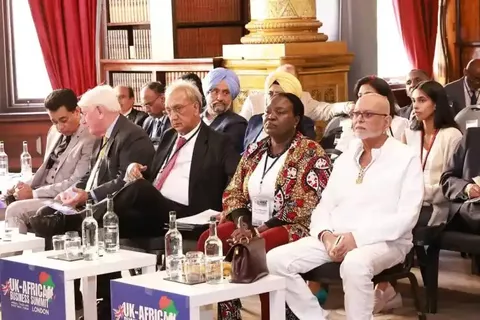Ugandan billionaire Sudhir Ruparelia used the 15th UK-Africa Business, Trade and Investment Summit in London to call on global investors to take a fresh look at Uganda as a country full of opportunity.
The event, which took place on 12 September at The Royal Horseguards Hotel, brought together more than 300 high-profile participants. These included ministers, chief executives, and senior officials from international organisations such as the World Bank. Uganda’s delegation was led by First Deputy Prime Minister Rebecca Kadaga and Energy Minister Ruth Nankabirwa. They promoted the country’s potential in energy, technology, and agriculture, while also emphasising that Uganda is positioning itself as a hub for trade with the wider African continent.
Sudhir, who serves as Chairman of the Ruparelia Group, spoke on the sidelines of the summit and pointed to real estate, agriculture, hospitality, and tourism as the sectors already driving growth at home. “Together with my family, we’ve invested wholeheartedly in Uganda, our beloved home,” he said. “The real estate sector is vibrant, agriculture offers endless opportunities, and hospitality and tourism are thriving. This is the moment to uplift our economy.”
The message carried weight because of Sudhir’s own life story. As a young man, he was forced into exile during Idi Amin’s regime and relocated to the United Kingdom, where he worked as a taxi driver to survive. He later returned to Uganda in the 1980s and began his business career with a small forex bureau. From that modest start he built what has become one of East Africa’s largest private business empires.
The Ruparelia Group now controls more than 300 real estate properties and owns some of the country’s best-known hospitality facilities, including Speke Resort Munyonyo and Kabira Country Club. The conglomerate has also invested in education, floriculture, insurance, and several other industries. Through these ventures, the group provides thousands of jobs and makes a significant contribution to Uganda’s tax revenues and overall economy.
Sudhir’s wealth is currently estimated at between 1.2 and 1.6 billion US dollars. He has become a symbol of both entrepreneurial drive and resilience. His business achievements are matched by a record of philanthropy through the Ruparelia Foundation, which funds projects in health, education, and social development.
Uganda’s economic environment, he argued, is also sending the right signals to foreign investors. The country’s GDP is expanding at 6.3 percent, inflation remains at a manageable 3.8 percent, and foreign direct investment has grown to 3.7 billion US dollars. He noted that the opportunities in oil, agritech, and tourism are especially attractive and highlighted Uganda’s geographic advantage as a gateway to Africa’s 1.4 billion consumers under the African Continental Free Trade Agreement.
The London summit also examined the future of digital trade, new opportunities in infrastructure, and ways to strengthen Africa-UK partnerships in the wake of Brexit. Uganda’s strong presence at the meeting was meant to show that the country is serious about attracting long-term investment.
Within that context, Sudhir’s intervention stood out. His words carried the authority of someone who has lived Uganda’s recent history, endured personal setbacks, and gone on to build a vast enterprise that employs thousands and reaches into multiple sectors of the economy. For the delegates in London, his example served as a reminder that Uganda is not only a story of potential but also a place where investment can deliver real results.










